PTU (2003)
Directed by: Johnnie To
Written by: Kin-Yee Au, Nai-Hoi Yau
Starring: Maggie Siu, Ruby Wong, Simon Yam, Suet Lam
HONG KONG
AVAILABLE ON BLU-RAY: 21ST JUNE, from EUREKA ENTERTAINMENT
RUNNING TIME: 83 mins
REVIEWED BY: Dr Lenera
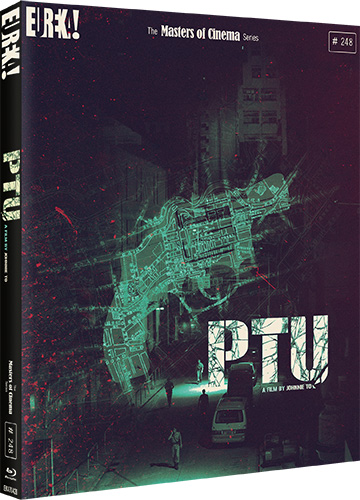
While pursuing a thug who keyed his car, Sgt. Lo Sa slips on a banana skin, is beaten up, and has his gun stolen. Sgt. Mike Ho of the PTU [Police Tactical Unit] decides to try and help Lo Sa, who’s up for a promotion, find the weapon before dawn; if it’s not recovered by that time, a report will have to be filed. Lo Sa knows that the culprits work for a gang leader called Ponytail, who was assassinated around the same time that his boys stole the sergeant’s piece. Ponytail was the son of a crime boss who’s keen on taking revenge on another boss he considers responsible. Then there’s Inspector Leigh Chueng of the CID who’s in charge of the Ponytail investigation, and who’s curious about what Lo Sa may be up to ….
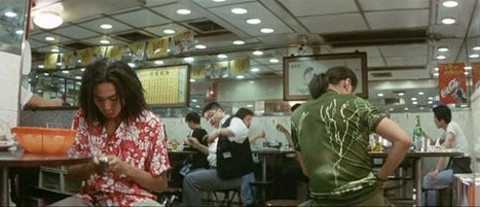
I’m going to be honest now and admit that, up to now, I’d never seen a Johnny To film. The director of mostly crime tales won acclaim and some popularity in the west with the like of Election and Running Out Of Time, and has been mentioned by Quentin Tarantino as a favourite of his. The latter is something that often gets me to check out a filmmaker, but for some reason his work passed me by. Therefore I went into PTU not entirely knowing what to expect; To’s films are known for combining sober realism and visual stylistics, which one would have thought wouldn’t go too well together. They also seem to be action orientated, though PTU must be an exception in that regard, since it doesn’t contain much action at all. Nonetheless, this minimalist, virtually neo-noir cop thriller, set mostly in deserted night time streets where a large single light often bathes the characters if they stand in the right place as if they were on a stage even though all the sets are real, taking place in a world of coincidences and near misses, and where the police are scarcely less brutal than the gangsters and both factions seems to need each other, most certainly has considerable merit. And as long as you don’t expect a bullet ballet, it should more than hold the attention. It’s a offbeat but really rather delectable melding of naturalism and style, which I guess might be typical of To, but does his other work manage to be as full of tried and tested elements yet put such a fresh spin on them? I guess I’ll have to see. PTU is tense yet whimsical, stripped down yet full of detail, grim yet funny. I’m probably using adjectives that don’t make much sense when put together, but this film is like that, it’s rather off-kilter in the best way and, while it perhaps doesn’t amount to a great deal when thought about afterwards, the unique ride it takes you on is certainly one worth paying for.
The special features of Eureka Entertainment’s Blu-ray will probably provide some details on the production, but there doesn’t seem to be much elsewhere, so let’s dispense with the usual background info paragraph. Sound effects of not very busy streets are heard over the opening titles before we get the view from the back of an armoured police van in which eight cops are sitting. Another cop has been killed, and we hear mocking comments about him, but leader Mike orders them to show some respect. This is only the beginning of us being shown a police force which is often at odds with each other. All the cops have the same goal, but actually working together isn’t always too easy. After the eight PCUs split up into two groups when they’ve got off the van, we cut to a cafe into which five youths strut in, don’t like the table that they’re seated at so take a table from another guy, insult the waiter, then the guy who’s supposedly our hero Lo Sa enters and sits at the same table, forcing the youths to move on. All this happens amid lots of long stares, and one wonders if no less than Sergio Leone was an influence. The scene also introduces what PCU will do throughout with its mixing of stretched out tension and wry humour, with lots of single takes. Several times we watch Lo Sa and the youths from a fixed point of view while also being aware of the guy who’d initially been displaced now sitting at a table facing the kitchen on the left hand side of the screen, introducing something else To will do throughout; arrange his characters very deliberately on the screen, as if they’re chess pieces. This seemingly innocuous guy casually gets up and stabs Ponytail the leader of this group in the back, but Lo Sa can’t do anything because he’s chasing the other ones who keyed his car. You’d think that he’d realise that there’s a trap when, whenever he briefly stops because he’s out off breath, the man he’s chasing does the same. In any case they’re waiting for him round the corner, he takes a different turn but conveniently slips on a banana skin and, like the hero of Stray Dog, has his gun taken.
His friend Mike asks fellow PCU Sgt. Kat not to report Lo Sa’s missing gun, giving him the rest of the night to find it, after Lo Sa has visited a toypshop with a not very helpful owner to get a temporary new gun. Mike and his men investigate separately. Mike is played by Simon Yam, and if you’re a seasoned veteran of Hong Kong films than you’ll know that few actors can be as intimidating as Yam. Here, his character uses violence and even plants drugs to get people to talk. He believes that his methods are necessary, though one could also say that he’s basically a thug in a uniform, as is one of his group who kicks a girl in the stomach then tells her to wash the muddy imprint from his shoe off, though the other two members, one of them a rookie out to learn things from Mike, clearly don’t like what they’re seeing. As for the portly, bandaged, constantly smoking Lo Sa, he’s selfish, incompetent and manipulative, though we still want him to find this blasted gun despite all the trouble it’s causing. Ponytail’s killer Eyeball is the main person he wants to find, and is soon in the company of Ponytail’s crime boss father Bald Head who has the other four youths who were in the cafe stripped naked and put in tiny cages in a striking image. We can actually feel the pain of Bald Head when he whacks the cages with a metal bar because he’s grieving. Maybe Lo Sa can set up a meeting between two gang leaders which will also hopefully enable him to get his gun back? But Mike’s more attention-drawing methods may not always be that helpful, and then there’s the matter of the nosy Leigh.
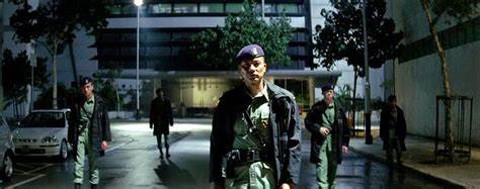
The plot concocted by screenwriters Yau Nai-Hoi and Au Kin-Yee is fairly straight forward, though it’s possible to lose track in places because the film doesn’t always seem to be too interested in it and prefers little distractions. A small boy rides a tricycle past some of the main characters several times. Lo Sa keeps bumping into a man who keeps making the same phone call in a phone box; he gets dragged into the violence but I couldn’t make out his exact role, unless I wasn’t being observant and had sunk too deep into the strange mood of the film, absorbing its vibe but not all of what was happening. A lengthy scene in the upstairs part of a supposedly closed restaurant where all the cops from the different factions [it wouldn’t surprise me if they insisted on getting all their food and drink free] gather yet seem to be plotting against each other almost resembles a weird condensing of some of King Hu’s films; well, To has stated that Hu was a major influence so I suppose one shouldn’t be surprised. Then there’s a lengthy sequence where Mike and his team arrive at an apartment block. Mike, who needs to get to one of the high floors, slowly makes his way up flights of stairs almost in real time, before first one, than three, of the others eventually follow. This takes absolutely ages, but we’re transfixed nonetheless, and then To throws us a surprise when the confrontation with bad guys we seem to be building up to doesn’t happen. Twice we cut to the outside of the building from some distance and see first one waving light, then four waving lights. It’s aesthetically very pleasing, even beautiful, even though the whole section matters naught in terms of plot and we could have just cut from the team entering the building to them at the door of their quarry.
Chang Chi-wing’s synthesiser and electric guitar score sometimes comes on at obvious moments and sometimes comes on at not so obvious moments. I wonder if it was intended to add more wry amusement, I can’t really tell with this particular film – and by the way that’s meant as a compliment. Apart from a final revelation with is both ironic and bitter, the peak of the film’s absurdist nature is when Mike keeps on ringing Ponytail’s phone having no idea that Ponytail is dead and therefore cannot answer. Lo Sa is on the scene of the crime and wants to answer, but to do so would draw attention to himself and he’d be tampering with evidence. Eventually he finds a hidden spot and answers, but all each of them says to each other for a while is “who are you”? It’s not played as comedy, as indeed are none of the humorous moments, which for some of us makes them all the more funny. Suet Lam could have easily played Lo Sa for cheap pathos or mockery, but instead he suggests a dark edge to the character. Amazingly, as the special features tell us, he wasn’t an actor but a production assistant whom To just decided to cast! I said near the start of this review that action isn’t prevalent in PCU but I frankly didn’t miss it. We do get a climactic gun fight with a lot of slow motion and people needing a hell of a lot of bullets poured into them before they will die, but John Woo this certainly ain’t. There’s nothing heroic about this bloodshed. We seem to be asked instead to think of the pointlessness and the absurdity of it.
As for the characters, they’re not quite developed but are evidently thought through; in classic 1970’s fashion, we’re invited to pick up certain things that are said, certain way in which things are done, rather than have a load of background stuff thrown at us. Lo Sa is an enigma, yet full of fascinating parts. He ends up having made a huge mistake which has caused much trouble yet some end up benefitting. Why is it I have the oddest feeling that he won’t have learned anything during his nighttime adventure and will just go back to normal? PCU really resembles something like After Hours more than any cop thriller I can think of. One thing’s for sure – I’ve just found a new director who I want to see everything by.
SPECIAL FEATURES
Limited Edition O-Card slipcase featuring new artwork by Grégory Sacré (Gokaiju) [2000 units]
1080p presentation on Blu-ray
It doesn’t say that this is a new restoration, so it must be a port of Mei Ah Entertainment’s 2013 Hong Kong release, though with probably a new encode. The picture is so superbly crisp and clear despite the often dark settings that you wouldn’t guess its age.
Cantonese audio (DTS-HD MA 5.1 and LPCM 2.0 options)
Optional English dubbed audio
Optional English Subtitles and English SDH
Brand new feature length audio commentary by Asian film expert Frank Djeng (NY Asian Film Festival)
The Region 1 Dragon Dynasty DVD release had an audio commentary from Bey Logan. That’s been replaced as has become the norm, though its three interviews are ported over. Djeng, who seems to be churning these tracks out yet with no loss of quality, steps in with a commentary that’s even denser than his one for Encounter Of The Spooky Kind, beginning with telling us what film the opening shot is taken from. We learn that it was shot all over Hong Kong despite supposedly taking place in one small area [at one point three miles are covered in a few seconds during a chase], that Yam slapped one actor for real so many times they had to use the other side of his face for reshoots a year later because he was still hurting, and that Maggie Shui had put on weight when they did said reshoots [the film took three years on and off to make] so they cut her character down. Djeng transmits his considerable appreciation of this film, while it seems that many of its quirks are ones typical of To. Good.
Interview with Johnnie To and Simon Yam [18 mins]
This was on the UK Third Window Films DVD release. The interviews seem to have been filmed when the film was just coming out, which makes it odd that one major twist at the end is given away. To says “the police methods are just a means to an end, it’s not important”, says how he doesn’t want people to leave the cinema unhappy, and doesn’t see his film as artistic. Yam mentions how his part was the hardest he ever had to act, how it’s a “very touching film” about human connection, and praises To and his methods. He seems genuinely proud of the film rather than just doing the usual promoting. You might be sick of some of the soundtrack pieces playing in the background after these two interviews though!
Into the Perilous Night – Archival interview with director Johnnie To [13 mins]
This and the next two interviews are from the Dragon Dynasty, so there’s a lot of time taken up with clips. To, certainly not repeating what he said in the earlier interview, says how he wanted to show team spirit, how the lighting style was inspired by Chinese painting with its indistinct backgrounds, and that he was given free reign with this project unlike his other films which were made with the box office in mind under some studio control.
On the Trail of the Smoking Gun – Archival interview with actor Simon Yam [21 mins]
Yam says how To demands loads of takes [he slapped that person two hundred time and still he came back for more] and shoots with no script so that actors don’t know what’s happening next, something which he says improved his performance, and that after the final scene he didn’t want to take that uniform off and kept wearing it for two hours. Apparently in Hong Kong people stay out of the way when film crews are shooting while in the United States they prefer to carry on doing what they were doing.
Cool as a Kat – Archival interview with actress Maggie Siu [12 mins]
Sui says something that slightly contradicts something that Yam said; she says that To does begin with a finished script, only that it would get changed day by day. She also mentions that Lam and Yam were both very funny, and how people kept mistaking the folk playing police for real police. She also seems extremely proud of the film despite her not being in it much due to her part having been cut down.
Trailers
A collector’s booklet featuring new writing by David West [NEO Magazine]
A rather unique spin on cops versus gangsters, Eureka’s Blu-ray release of ‘PTU’ cones Highly Recommended!




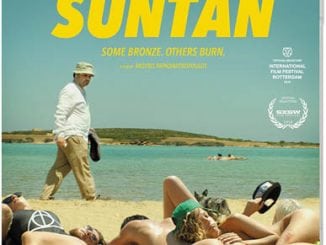

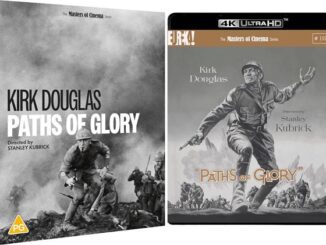
Be the first to comment